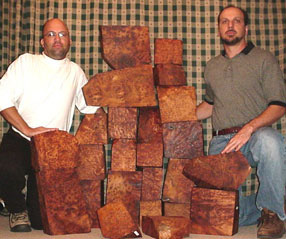
How two native New Yorkers became major US importers of thuya wood — one of the most beautiful burls in the world — is a story of serendipity, coincidence, and opportunity.
The serendipity occurred in 1999, when Don Mogelefsky found himself on a long, 30-hour bus ride from Valencia, Spain, to Marrakech, Morocco. A journalist, who’d just finished a two-year stint in Prague, he was making his way south & where he hoped his money would go further & and last longer. When the bus reached Casablanca, everyone but Don and another Moroccan gentleman got off.
Don Mogelefsky, some of their inventory, and Gerard Romeo
“And we still had five hours left,” recalled Don. “So we struck up a conversation. It turned out he had just moved into a new place and was renting out rooms for $5 a night. I ended up staying with him for a couple of weeks.”
When Don got back to New York, they stayed in touch via e-mail. His new friend was an entrepreneur and frequently bounced his latest schemes off Don. None offered any appeal until the Moroccan suggested working together to export thuya (pronounced TOO-yuh) wood into the United States. Don hadn’t heard of the wood before (in spite of his trip to Morocco), didn’t know much about wood in general, and knew even less about importing, but the idea caught his interest.
Coincidently, his old high school friend, Gerry Romeo, had also been to Morocco and had seen the wood, fallen in love with it, and brought back some carvings and turnings.
They saw the opportunity, looked into it, seized it, and began a long, still ongoing, learning process.
“We started in 2000, and it took a while to get everything together,” explained Don, “And we started small with a half ton of wood & which sound like a lot, but is small for a wood dealer.”
Though Morocco has close friendly ties to the United States, it is still a third world country. To carry out the heavy thuya burls, donkeys and camels are taken high up into the mountains. There’s a ready, if finite, supply of the burl to be dug up. (Thuya burls are found in the root section of the trees which are left behind when the rest of the tree was harvested.) Craftsmen have prized thuya, sometimes called the king of woods, for thousands of years, but most of the trees (a coniferous that once covered the Atlas Mountains of Algeria and Morocco) have been cut down for housing.
The first shipment that arrived in October of last year was an exciting event & in more ways than one. Don and Gerry drove over to the docks to pick up the shipment. Since it was a small shipment, their man in Morocco had carefully crated each piece. So, one month after the 9/11 attack, dozens of small boxes with Arabic writing awaited them in New Jersey.
“Customs had a field day. Every box was ripped open and carelessly taped back together. When we got them loaded up we felt a little nervous about driving through Manhattan. There we were in Gerry’s white van full of these boxes – my background’s eastern European, Gerry’s is Italian – and we could both pass for Arabs. We decided to take the long way around on the George Washington bridge, and luckily we made it back out to Long Island without any problems.”
Long Island is where Gerry lives and owns a carpet and tile store with the warehouse space to store the wood. Don lives in New York City. In operation, Gerry handles order fulfillment and customer service, while Don is the marketer and creator of their web site. They’ve also sent out a brochure to regular woodworkers and have been hitting the trade show circuit. Since the unpolished burls look pretty rough, the carvings that Gerry originally brought back helped show the finished product. They got a lot of attention at this year’s American Association of Woodturners Symposium in Providence, RI.
“People who knew the wood went crazy over the quality, and when they started to smell it,” Don recalled, “I felt a little like a drug dealer.”
For the record, it smells a bit like cedar. The excitement the show produced is well founded. Though pieces are usually too small for furniture, the hard wood is excellent for inlays, small boxes, turnings, and other small items. Knife and pool cue makers especially prize the wood.
“Even though it’s not the best time to be importing from a Moslem country, and you have to have lots of patience, it’s worked out fantastically well,” declared Don, “Our friend in Morocco knows we’re a great outlet and send us primo quality. We’ve now sold about 50% of that first group. The next shipment is going to be real interesting because there will be tons this time in a container.
The timing of the next trade show they attend depends on the arrival of that next shipment. When the temperature is too high, and it’s usually around 115 degrees this time of year, the burls could warp or deform during shipment. So, they have to wait for the weather to change.
In the meantime, to get even better acquainted with the wood, Gerry and Don are planning to start doing some woodturning & once Gerry gets a lathe set up in his warehouse. They have plans to offer blanks for knives and perhaps offer a selection of carving and turnings from Morocco. As thier business keeps growing, it’s possible they might add other exotic woods some day.
The web site will also expand, and Don has even begun using his newfound web skills to design several other sites and is checking into affiliate programs. But what he’s really looking forward to is returning to Morocco and going on one of the burl hunting expeditions with donkeys and camels into the mountains.





